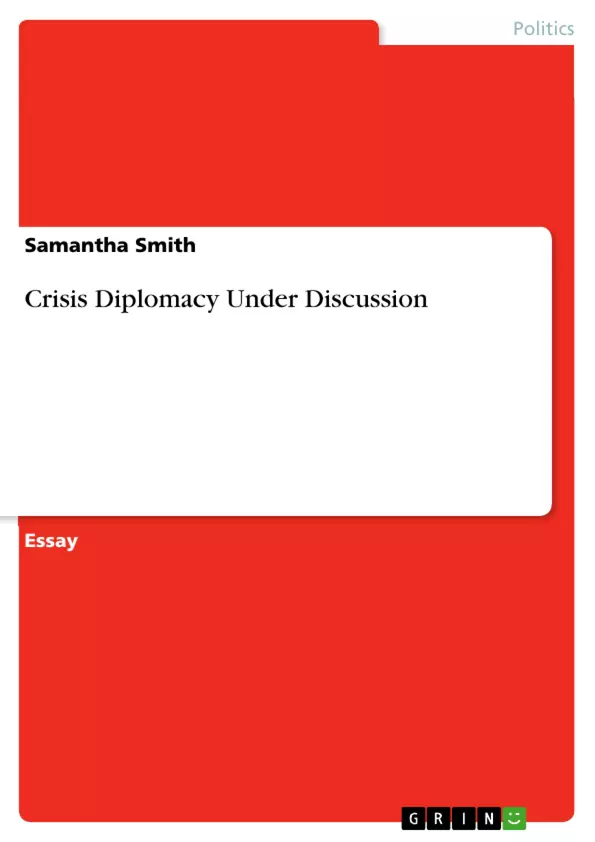This paper will argue that though the character of crises occupying the international agenda may have changed, the skills and expertise possessed by professional diplomats have proven to be irreplaceable in addressing crisis situations. It will do this in two parts.
First, it will briefly examine traditional formations of ‘international crisis’ and ‘crisis diplomacy’, arguing that these concepts need to be adjusted to encompass the contemporary global environment. Second, it will compare the efficacy of state and non-state agents in mediating crisis situations, demonstrating that professional diplomats are still without equal.
Table of Contents
- 1. Understanding crisis
- 1.1 Understanding crisis
- 1.2 Red phones and signals
- 1.3 A concept in crisis
- 1.4 Mediation as crisis diplomacy?
- 2. Mediation as a lesson in crisis diplomacy
- 2.1 Mediation as a lesson in crisis diplomacy
- 2.2 Track One, Track Two and Track One and a half
- 2.3 An argument for non-professionals
- 2.4 Professional diplomats unparalleled
Objectives and Key Themes
This paper aims to demonstrate the continued irreplaceable value of professional diplomats in resolving international crises, even in the face of evolving global dynamics. It argues that while the nature of crises has changed due to globalization and technological advancements, the unique skills and expertise of professional diplomats remain essential.
- The evolving definition of "international crisis" in the context of globalization and technological advancements.
- The changing roles and relative importance of state and non-state actors in crisis resolution.
- A comparison of the effectiveness of professional diplomats versus non-professional actors in mediating crises.
- The limitations of traditional understandings of crisis diplomacy in addressing contemporary challenges.
- The need for a revised understanding of crisis diplomacy that accounts for the increased complexity and diversity of modern crises.
Chapter Summaries
1. Understanding crisis: This chapter explores the evolution of the term "crisis" within international relations. It examines traditional definitions emphasizing state-centric interactions and the high probability of war, contrasting them with contemporary understandings that encompass a broader range of actors and threats. The chapter highlights the limitations of traditional definitions in capturing the complexity of modern crises, which are increasingly diverse and less focused solely on interstate conflict. Key scholars and their contributions to the definition of crisis are also reviewed, showing a progression of thought in how crises are both understood and tackled.
2. Mediation as a lesson in crisis diplomacy: This chapter delves into the practice of crisis diplomacy, contrasting traditional approaches with the complexities of the contemporary global environment. It examines different schools of thought, including rational choice theory and psychological/behavioral perspectives, exploring how these frameworks influence the understanding and management of crises. The chapter assesses the roles of various actors, including professional diplomats and non-state actors, in mediating international crises, setting the stage for a further analysis in subsequent chapters concerning the importance and irreplaceability of professionally trained diplomats.
Keywords
Crisis diplomacy, international relations, professional diplomats, non-state actors, globalization, mediation, crisis management, strategic bargaining, rational choice theory, traditional vs. contemporary understandings of crisis.
Frequently Asked Questions: A Comprehensive Language Preview
What is the main topic of this paper?
This paper argues for the continued irreplaceable value of professional diplomats in resolving international crises, even with evolving global dynamics. It examines how the nature of crises has changed due to globalization and technological advancements, but emphasizes the enduring necessity of professional diplomats' unique skills and expertise.
What are the key themes explored in the paper?
Key themes include the evolving definition of "international crisis," the changing roles of state and non-state actors in crisis resolution, a comparison of the effectiveness of professional vs. non-professional mediators, limitations of traditional crisis diplomacy understandings, and the need for a revised understanding of crisis diplomacy in the face of modern complexities.
What are the chapters and their respective focuses?
Chapter 1: Understanding Crisis explores the evolution of the term "crisis" in international relations, contrasting traditional and contemporary understandings. It analyzes the limitations of traditional definitions and reviews key scholars' contributions to the definition and handling of crises. Chapter 2: Mediation as a lesson in crisis diplomacy delves into the practice of crisis diplomacy, contrasting traditional and contemporary approaches. It examines different theoretical frameworks (rational choice theory, psychological/behavioral perspectives) and assesses the roles of various actors (professional diplomats, non-state actors) in mediating international crises, emphasizing the importance of professional diplomats.
What are the objectives of the paper?
The paper aims to demonstrate the continued importance of professional diplomats in resolving international crises. It seeks to highlight the unique skills and expertise of these diplomats in navigating the complexities of modern crises, even as the definition and nature of crises themselves have evolved.
What keywords best describe the paper's content?
Crisis diplomacy, international relations, professional diplomats, non-state actors, globalization, mediation, crisis management, strategic bargaining, rational choice theory, traditional vs. contemporary understandings of crisis.
What is included in the language preview?
This preview offers a comprehensive overview, including the title, table of contents, objectives and key themes, chapter summaries, and keywords. It provides a structured and professional analysis of the paper's core arguments and findings.
What is the intended audience for this paper?
The intended audience is likely academics and professionals in the fields of international relations, diplomacy, and conflict resolution. The structured and detailed analysis suggests a focus on a scholarly audience.
- Quote paper
- Samantha Smith (Author), 2012, Crisis Diplomacy Under Discussion, Munich, GRIN Verlag, https://www.grin.com/document/309808



